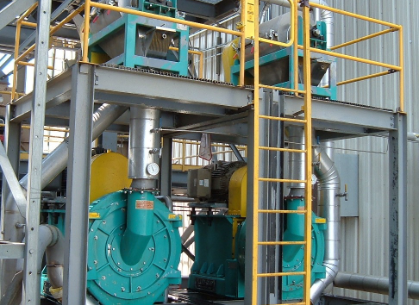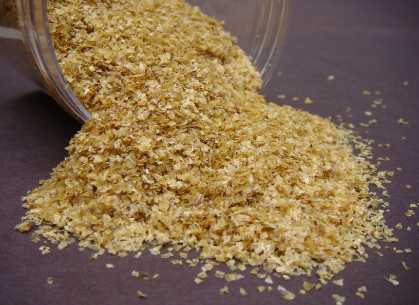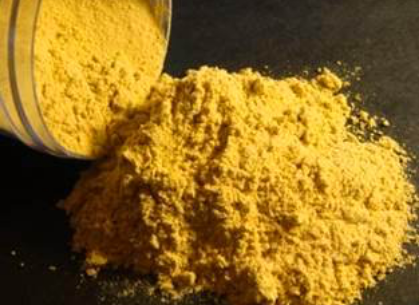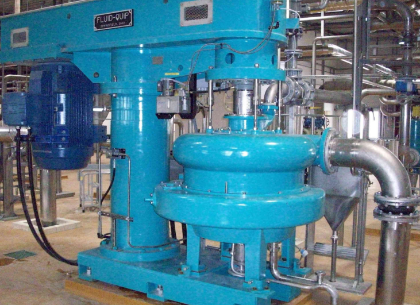WE PROVIDE
VALUE TO OUR
CUSTOMERS
Our suite of technologies build upon one another to ensure continuation in the technology evolution curve. They operate in an additive way, thus never stranding capital or equipment.
We have installed and proven all of them at full scale and we have multiple active projects in the USA, Canada, South America an Europe.
Increases ethanol & oil yield
FQPT developed the SGT to increase oil and ethanol yield. The project was designed to grind the wet suspension together with liquefaction. It is based on selecting the particules sizes which contains starch that can be hydrated. Therefore, the starch can be break into sugars on the liquefaction system.
• Increase the ethanol income from 3 to 5%
• Increase the oil income in up to 30%
• Saves Energy in Hammer Mills
• Reduce feed rate/size of the DDG dryer
• Does not consume energy milling water, only the ground particule going to fermentation
• Personalized milling solutions, reduce the amount of starch in DDG (more oil can be recovered with pro/fat specifications)
• Several Grind Mill sizes to optimize the performance based on plant needs
• Grind Mills from 24” and 36” and Disc Mill from 36”, 40” e 52”

Increase the production capacity
FQPT has developed the FBP Fiber By-Pass System to separate fiber before or after fermentation. FBP allows up to 10% increase in fermenter capacity, wich can increase plant throughput.
FQPT has multiple FBP systems operating at both biofuel and biochemical facilites. The FBP system leverages the SGT grind system to release starch and oil from fiber. The FBP then utilizes patented Fluid Quip, Inc, MZSA screens to wash and separate fiber from starch, sugar, and oil stream feeding fermentation. The separarted fiber stream is very low in residual starch and can be dried separately or re-combined with stillage to produce standard DDGS .
The FBP can be used to produce pure fiber, which is an excelent feedstock for cellulosic ethanol or industrial applications.
• Removes fiber pre-fermentation
• Increase fermentation capacity
• Up to 10% plant production gain
• Reduce destillery energy (8% less steam)
• Reduce risks of infection

Recover corn oil on front end
FQPT has developed the patente-pending Brix Oil Separation BOS system to recover oil from liquefaction. No germ separation or solvent extraction is required. Free oil separated from liquefaction stream via the Fluid-Quip, Inc, Triton Centrifuge can treat the entire liquefaction stream from the dry-grind ethanol facility. The exclusive system recovers a low Free Fatty Acid (FFA) Oil, which is a high value industrial freestock.
The BOS System recovers free corn oil on the front end which lowers the free oil contente in fermentation. This allows for more oil extraction throught fermentation and back-end oil yields are still significant. The Front-end + Back-End oil yields are greater than 1,0 lb/Bu (18 kg/ton).
The BOS System is installed in conjuction with the FQPT SGT grind system. SGT helps to break apart the germ and release free oil in the slurry system. The BOS System has been in full scale operation since 2012.
• Average yield of 0,5 lb/Bu (6 kg/ton)
• BOS oil: 5 to 7% of Free Fatty Acid (low FFA)
• BOS Yield + back-end oil yeild is higher than 1,0 lb/Bu (18 kg/ton)
• In Full Scale Operation since 2012

High Value Protein from Stillage
Produce a 50% purity protein product.
FQPT has developed the patented MSC system to produce an alternative high-value protein product. Has been in full scale operation since 2009.
The system produce Still Pro 50, a 50% purity protein product that trades in the alternative high value protein Market. Is an unique blend of spent brewer’s yeast and corn gluten meal. The protein has shown great success in the poultry, aqua, swine, dairy, and pet fod Market.
The MSC can be adjust to allow plants to meet current DDGS specifications by adjusting the production rate of Still Pro 50. Yields can be achieved up to 4,5 lb/Bu (80 kg/ton).
Operational Benefits
• Clarifies Evaporator Feed Stream
• Clarifies Backset
• De-bottleneckd Evaporators and DDG Dryers
• Reduce/Eliminates Evaporator Fouling
• Syrup Solids Increases Significantly
• Reduce DDG Dryer Load
• No adicional Water Required
Economic Benefits
• ROI Less than 2,5 years
• 1/3 of EBITDA gain from oil yield increase
• Still Pro 50 is Hedged to SBM + Values
• Diversifies Plant Revenue Stream

Produce clean dextrose and/or frutose line at low cost
FQPT has developed the patente-pending Clean Sugar Technology (CST) to produce an industrial clean sugar product for biochemical and advanced bioful appplications. The commercially proven CST system can be installed as a bolt-on toa n existing biofuel facility or implemented at a greenfield biochemical site.
The CST System produces an equivalente sugar quality to that of a Corn Wet Mill process at an up to 30% cost reduction. The CST CAPEX is >50% lower than a tradicional Corn Wet Mill.
FQPT Works extensively in the biofuels ans ethanol sectors and can help leverage slip-stream ‘over-the-fence’ opportunities with existing ethanol producers. The CST system not only produces an industrial sugar stream, it also yields a high-value corn oil strem and can produce valuable animal feed products including a high-purity protein stream.
The CST System is in full-scale operation at a biochemical facility in the US. The system utilizes multile proven FQPT integrated systems and leverages equipment that is widely used in industrial applications. The experienced FQPT team offers full engineering of the CST equipment, and full startup support and training of opperations staff.
• Clean Sugar from ethanol for biochemicals applications
• Low costs Purified dextrose and/or fructose Streams
• Bolt-On Commercially Proven Technology
Co-located Wet Fractionation System
at a Sugar-Cane Mill
Corn + Sugarcane
FQPT has developed the WFS system , wich consists on making multiple corn products on a dry mil ethanol process. To attend the South America Market, where the sugar-cane mills suffers with the off season problem, FQPT has proven the application of the WFS co-located at a sugar-cane mill to process corn for ethanol production.
A common ethanol production produce ethanol and DDG, wich is a product destined to animal nutrition of cattle. The flex plants, with FQPT system, allows that besides ethanol and DDG, the plant to produced oil and corn protein, also enabling the plant to operate in full capacity through the entire year: season and off season, without altering nothing on the process of the sugarcane.
